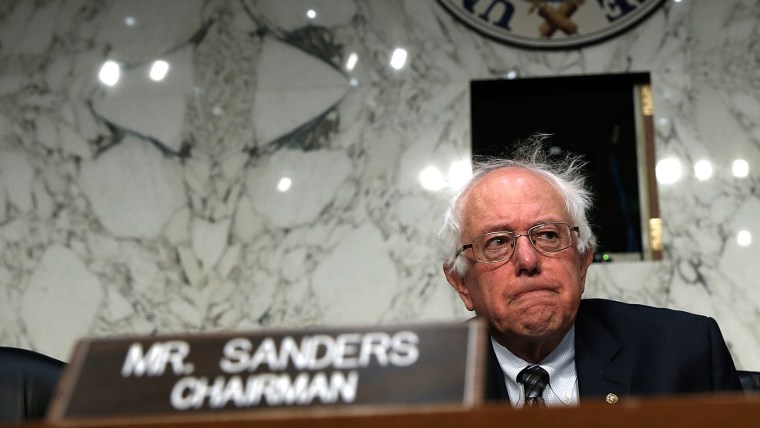About a week ago, Sen. Bernie Sanders (I-Vt.) unveiled legislation to make Election Day a national holiday. It's not a bad idea -- plenty of folks might want to vote on the first Tuesday in November, but face scheduling restrictions. Early voting is available in many states, but not all.
Many have suggested moving Election Day to a weekend, but if that's not going to happen, it's not unreasonable to think voter participation would improve if there were a declared "
Democracy Day," as Sanders suggests.
"In America, we should be celebrating our democracy and doing everything possible to make it easier for people to participate in the political process," Sanders said in a statement. "Election Day should be a national holiday so that everyone has the time and opportunity to vote. While this would not be a cure-all, it would indicate a national commitment to create a more vibrant democracy."
So what's wrong with this? Off the top of my head, I can't think of anything, though
National Review appears to
have some concerns.
If Bernie Sanders has his way, "Democracy Day" will be the crowning holiday of America's dystopian future. Imagine: Everyone in slab-gray uni-gender tunics and biodegradable Crocs, all lined up in perfect uniformity to cast a legally mandated vote for the single party that remains. Democracy! Pharrell's "Happy" will play over loudspeakers in the background. On loop.
Low turnout might well indicate a small group of very interested people, and that might be a better indication of the country's desires than truckloads of people completing a ballot because they felt obligated -- or, worse, faced a penalty if they did not.
I'm not sure if this is intended as satire, but National Review seems to be arguing that if a significant number of Americans want to participate in their democracy, and feel a civic duty as a citizen, but they can't vote because of time constraints, that's OK -- because people with more leisure time are better motivated?
Furthermore, on the left, low turnout is a problem only when Democrats lose, because Democrats assume that the majority of those people who stayed home would have voted "D."
This is oddly backwards. There's nothing partisan about Bernie Sanders' proposal or any other effort to expand voting opportunities. The same cannot be said about Republicans' aggressive campaign against voting rights in recent years, which, by design, targets minority communities, students, and the poor, precisely because GOP policymakers believe they're likely to vote Democratic.
Consider the other federal holidays you already celebrate by ignoring them: Do you have your false teeth ready for Presidents' Day? How did you pass Columbus Day -- admiring a wall map and evangelizing the natives? Giving Americans federal license to lie in bed all day is probably not going to encourage robust political activism.
Or, maybe it's ridiculous to assume that Americans who want to cast a ballot in their own democracy would prefer to "lie in bed all day" instead of voting.
But of all the reasons not to support "Democracy Day," perhaps the most obvious is that . . . it's creepy. Not a few observers over the years have noted that "democracy" is a word that tends to be used in celebratory ways primarily in places that do not practice it: for instance, North Korea, a.k.a. the Democratic People's Republic of Korea. Governments take to lauding democracy as a way of concealing the fact that it no longer exists.
Wait, wait, wait. Under conservative political correctness, "democracy" is now "creepy"? When did this happen?
What Sanders et al. want in "Democracy Day" is, indeed, a holiday -- but in its original meaning: a "holy day." They worship "democracy." The very word is an enchantment against all forms of political evil. On "Democracy Day," we would all do obeisance.
I see. Setting aside a day for people to vote and celebrate our form of government is creepy. Fearing a dystopia featuring slab-gray uni-gender tunics -- and biodegradable Crocs -- in which people literally "worship" our form of government is perfectly normal.
[I]n a functioning democracy, every day is Democracy Day.
And if more Americans can exercise the franchise, our democracy would function more effectively.
